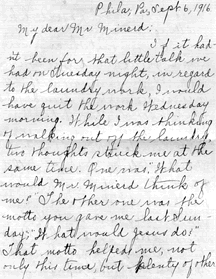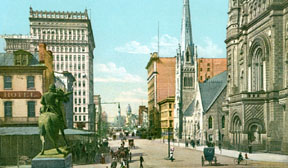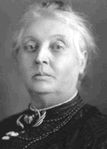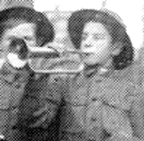
|
Keep Sweet! |
|
A Memoir by the Late Dr. Roy Sheppard Minerd - Part 7 of 12 |
Last month: Under the constant, loving but firm guidance of their mentor Roy S. Minerd, the lives of the orphan boys at Philadelphia's Northern Home are transformed at deeper levels, and they begin to form the Personal Workers Band. Rules are written, governing the requirements for Band membership.
|
|
|
Dawson |
So much interested did Dawson (seen here, with bugle) become that one Tuesday evening after a Scout meeting he said, "I don't like my work very well at the laundry (he worked in the Home laundry) especially since it takes so much of my time that I can't see and talk to the boys about this work. Would you advise me to give it up so I can devote all my time to helping the fellows become Christians?"
I looked at him in amazement. Here was one of two boys chosen by the superintendent out of 70 to do the laundry work for which he was regularly paid in money -- a chance any of the boys would have jumped at -- willing to give it up so as to devote all his time to the Master's work among his fellows! Can you beat that?
He told me also that there were so many temptations there to do wrong things and to give way to temper, etc., and he wanted to get away from them.
I replied: "Are you running from temptations? Who knows but that the Almighty is sending or permitting those temptations to test you or to give you a chance to grow stronger by overcoming them? Are you going to brush aside the very things which will, if you make use of them, help you wonderfully in your efforts at Christian growth?"
A puzzled look came over his earnest face and gradually it changed into a smile and his whole face lighted up as my meaning became clearer.
"I see now," he said. "I never thought of that," and gripping my hand he said, I'll stick!"
 |
|
William O'Dell's postcard to Roy |
I told him so far as his time was concerned, that with a limited time at his disposal, he would likely make much better use of it than if he had all day at it, and more could be accomplished under careful arranging of his work during those spare moments. I reminded him also that if one wants work done, he must go to one who is always busy. Within a few days the letter which appears on the following page came to me. I have read and reread it many times and it has helped me a lot.
Phila, Pa., Sept. 6, 1916
My dear Mr. Minerd:
If it hadn't been for that little talk we had on Tuesday night, in regard to the laundry work, I would have quit the work Wednesday morning. While I was thinking of walking out off the laundry, two thoughts struck me at the same time. One was, "What would Mr. Minerd think of me?" the other one was the motto you gave me last Sunday; "What would Jesus do?" That motto helped me, not only this time, but plenty of other times. This is why I felt like quitting:---
I told you that the engineer was a grouch and was sour. Wednesday morning, one of the boys came over to the laundry and said Miss Sexton let him use the hose. Mr. cook (engineer) told him to get away from it. The boy told Miss Sexton that Mr. Cook wouldn't let him have the hose. He (the boy) then came over to the laundry and said that Miss Sexton said I should give him the hose. I got the wrench to take it off the spigot. Mr. Cook asked me what I was going to do. I told him and he said, 'Give me that wrench.' I handed it to him and he tried to hit my hand with it. Then he said, 'Do you think I am going to let those boys have the hose so they can break it again, for me to fix?' I replied, 'but Miss Sexton said they could have it.' He then threatened to 'lay the razor strap on me if I was sassy with him.' I then went and asked Miss Sexton if she had said that I should get the hose for the boys. She replied that she said no such thing and that the boy lied.
Well, that ended it. I have, or rather Odell and I have five boys so far, who would like to come up in chapel. I would asked them in this manner: Name, do you want to come up in chapel with Mr. Minerd next Sunday? (Yes) Answer What do you want to go up for? They usual answer was 'To learn about Jesus and how to become a Christian.' Odell will say a few words now.
My Dear Mr. Minerd, I am trying hard to keep up the motto. We have 5 members. I can hardly wait till Sunday so I may see you again. Good by until Sunday.
With Love, William & Odell
2 Tim. 2:15
On an early page I mentioned, in connection with my talk with E.P. on Sunday afternoon, that Kurtz had climbed over the fence and run away. When he was brought back by Minton, his punishment consisted of wearing dresses for the rest of the day. He fought valiantly but soon submitted to the inevitable and sat pouting and sobbing in the yard in view of all the children. After a little I carelessly walked over and seated myself beside him on the lawn seat where were several other boys, and began to tell a story.
Just as carelessly I slipped my arm over his shoulders and he yielded, unconsciously perhaps, to the slight pressure as I drew him close to me and soon he was resting his head on my shoulder, the very picture of exhaustion from his race, his temper and his crying. He grew quiet as the story proceeded and soon forgot his dresses. Later in the evening I drew him aside and had a little chat with him about his escapade. He had been in the Home but four days and previous to his admission and raced the streets from daylight till midnight, at his will, and of course found it irksome not to be able to go when and where he pleased. It was, to be sure, a decided change to which older and wiser humanity would not adjust itself in so brief a time.
 |
|
Philadelphia's Broad Street during the era |
Then, too, a new boy in any crowd always is self conscious and in truth is the one to stand the brunt of a lot in the endeavor of the rest to find what sort of stuff he is made of. All of this proved too much for his 10 years, so he jumped the traces (and the fence) and sought to escape. A few well directed questions confirmed my diagnosis and he told me his tale. I tried to show him the advantages of the Home life and asked him to wait till he had had more time to get acquainted and adjusted before turning it all down as he had. He promised me he would, and he did. Within a few weeks he was spoken of as one of the least troublesome and most obedient and agreeable boys in the Home.
About the time of the death of Kent's father, described earlier, several of us were talking about parents, when one little fellow remarked, "I don't know where my mother is."
"How's that," I asked.
"Well, I was home at Christmas, and when I went back a few weeks later she had moved and I couldn't find her. No one around knew where she had gone, and she didn't let me know. I haven't heard from her nor seen her since."
 |
| The author's mother, Margaret Minerd |
And this was in August!
Is there any limit to the beastly -- no, that is wrong; a beast would not leave its young -- dastardly work that the devil will put it into the human mind to do? Can you or I imagine such a thing? We watch our little jewels play and hear their prattle, feel their little arms in a love caress about our necks, and we crush them to our bosoms as we feel their velvet fingers on our cheeks, and with our hearts bursting with love for the treasures God has loaned us we cannot conceive of a parent doing such a deed, and yet it happens over and over. O the treachery and the infidelity of sin!
And then the boy! Our feelings are so keenly injured at the thought that we are one too many in a company of our associates, and we resent long and bitterly the inference that we are "not wanted" by an erstwhile friend. But to be deserted by a mother!
What does mother mean to you and to me! How it carries us back to the days when something happened which darkened the sky, which broke our hearts, which destroyed our happiness so completely that it seemed that we never could be happy again! And who caused the clouded sun to shine again; who comforted and healed that broken heart; who kissed away the sorrow, the unhappiness, the anguish and showed us the way out of our trouble? Mother! Ah! Those Mothers! Those of us who have or had Mothers -- what would our lives have been had it not been for them? Whom did we seek for advice ad help and guidance in the solving of the many puzzling problems that confronted us as we grew to boyhood and manhood? Never too tired nor too busy to listen, always sacrificing herself and her pleasure to satisfy our ofttimes foolish and selfish whim, never complaining -- she who gave us life, was our life, is and will till our dying day be our life -- Mother! Thank God for Mother!
| 'Those of us who have or had Mothers -- what would our lives have been had it not been for them? Whom did we seek for advice and help and guidance in the solving of the many puzzling problems that confronted us as we grew to boyhood and manhood? Never too tired nor too busy to listen, always sacrificing herself and her pleasure to satisfy our ofttimes foolish and selfish whim, never complaining -- she who gave us life, was our life, is and will till our dying day be our life -- Mother!' |
Then does not your heart go out with mine in sympathy, in love, in compassion for the boy whose life has been deprived of all that Mother means? It is difficult and often impossible to see why the Father in His wisdom deprives a boy of his mother, but what can we say for a by deserted by a faithless creature who gave him birth and nothing more but an inheritance of depravity and viciousness such as must come from one who would act so, and which must prove a millstone about his neck all his life? A boy with a heart yearning to love and be loved! How oft has he repeated to himself that thought, "My mother doesn't want me!" Does it not stir you to the very depths of your soul? Does it not arouse all your fighting blood in a determination to battle to the very death to down this monster who causes such agony of soul and laughs as he sees the results of his fiendish work and realizes the heartaches and sufferings he has wrought! What if you had been such a boy! What if your boy were placed in such a position!
And then comes the thought of A.E. His parents both are living but separated -- a mother who would a thousand times better never have been born, and a drunken scoundrel of a father who is a stench in the nostrils of the community. The boy in question (whom for convenience we shall call Tom altho that is not his name) up to Jan. 1, 1916 had been in the Home for 11 years. An older brother, who shall be "Dick," had been honorably dismissed from the Home two or three years previous to my acquaintance with Tom, and sent to his father. He was then about 16. Shortly thereafter an old farmer, desiring to adopt a boy to help about the farm, applied to the Home folks and asked for this particular boy, Dick, of whom someone had spoken to him. As Dick was no longer under their control, he was directed to Dick's father whose eligibility on the title 'Father' may be judged from his answer, without a moment's consideration or thought and without the least inquiry into the sort of place in which Dick was about to be placed.
"Take him if you want him. I don't care where he goes or what becomes of him."
Next month: Some of the more troubled boys, such as Dick and Tom, have deep and life-threatening problems which even Roy's teachings cannot overcome. We learn more about these boys' heartbreaking stories.
Copyright © 2002 Mark A. Miner
